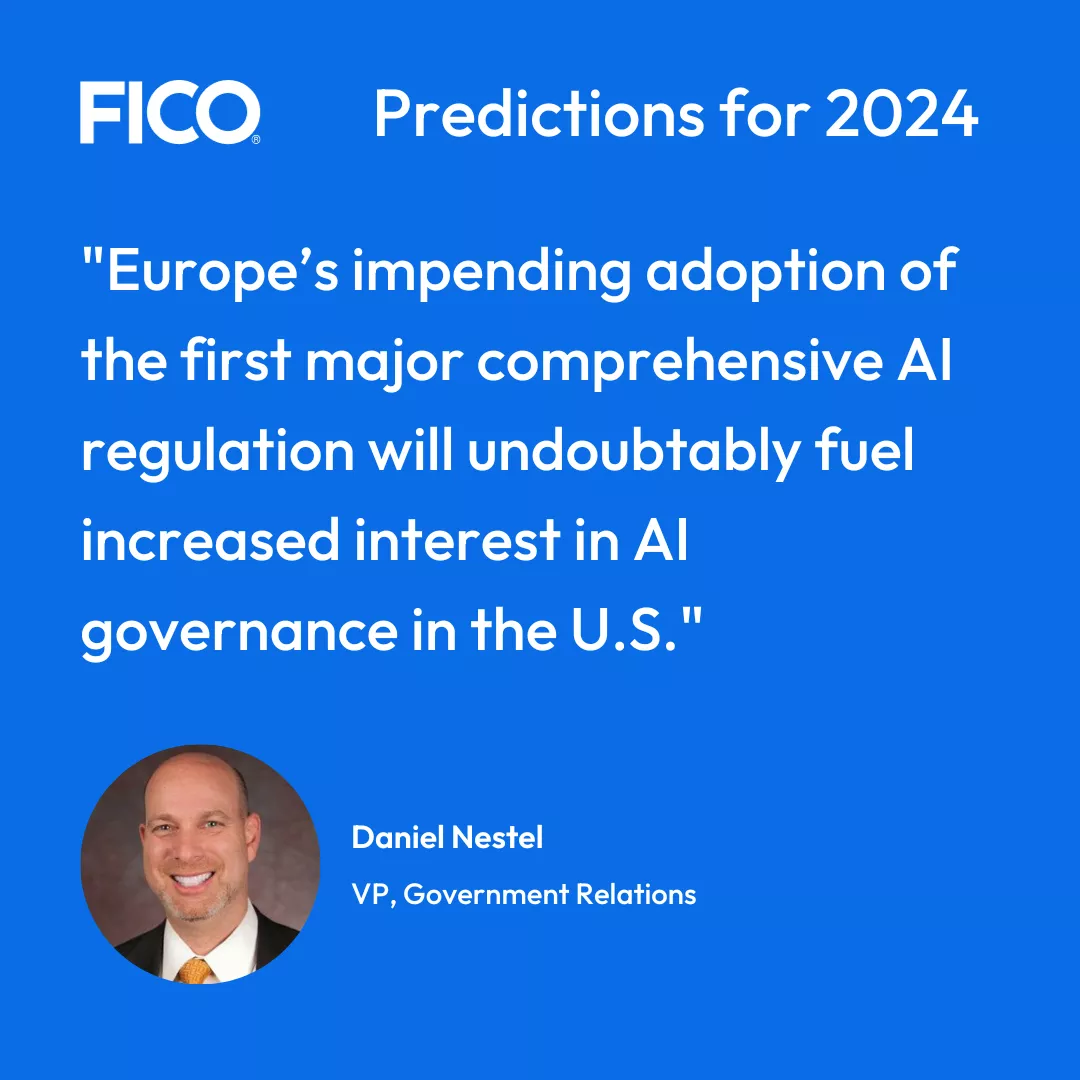Policy Predictions 2024: Navigating Regulatory Uncertainty in Banking
Upcoming US elections loom over the outlook for the US financial services industry, but regulations on AI, open banking and more are expected

Public policy predictions are never easy to make, but an election year adds an additional level of uncertainty. With this in mind, I hope you will be generous in cutting me some slack should some of my predictions below take a 180-degree turn based on the results in November.

1. AI Regulation Will Be Driven by the States
Despite significant federal policy developments on AI in 2023, like the NIST AI Risk Management Framework and President Biden’s AI Executive Order, the adoption of federal legislation to govern AI still appears to be off on the horizon. Meanwhile, 2023 saw a wave of AI-related state legislation. Nearly 200 bills were introduced in 31 states.
Europe’s impending formal adoption of the first major comprehensive AI regulation will undoubtably fuel increased interest in AI governance in the U.S. With little expected legislative activity in Congress during an election year, states will no doubt take the lead in 2024. Look for at least one state to enact comprehensive AI legislation, impacting how financial institutions use AI-powered tools and manage risk-based compliance.
For more AI predictions, I encourage you to check out FICO Chief Analytics Officer Dr. Scott Zoldi’s blog post.
2. Expect a Lot of Activity in the New Year — But No Final FCRA Regulations
There was no shortage of attention when the Consumer Financial Protection Bureau (CFPB) released its SBREFA outline detailing proposals being considered as part of a Fair Credit Reporting Act (FCRA) rulemaking effort. The outline includes provisions addressing data brokers, credit header information, a prohibition on the use of medical collection information and clarification on permissible purposes for consumer reports, among other topics.
A proposed rule is expected sometime in 2024 but given the potential impacts on a broad scope of businesses, the proposal is expected to generate a large volume of public comments and its share of congressional scrutiny. The November presidential election could determine whether the CFPB issues a final rule in this area in 2025, potentially influencing compliance requirements for a wide range of businesses in the financial services market.
3. Online Lead Generation Will Experience Significant Changes as Consumers Gain More Control over Their Cell Phone
The Federal Communications Commission's (FCC) recent rule changes include a requirement for comparison shopping websites (e.g., online loan comparison businesses) to obtain separate consumer consent for calls or texts to a mobile phone for each lender/seller at a time. This replaces the common practice of comparison sites obtaining a single upfront consent covering multiple marketers. The implementation of this rule will necessitate significant changes in how financial services lead generators and digital marketers operate, including an overhauling consent management processes to ensure adherence to the new federal regulations.
4. Final Regulations Will Be Adopted Accelerating Open Banking and Innovation
In 2023 the CFPB introduced a proposed rule that grants banking consumers the right to access and port their financial information between banks and other financial entities. Open banking is based on the concept of permitting the networking of accounts and data across institutions for use by consumers, financial institutions, and third-party service providers. Dozens of countries have open banking regulatory regimes in place, and this has led to new innovations in the financial services sector.
FICO has recognized the benefits of open banking with its introduction of a consumer-permissioned alternative data score, UltraFICO Score, leveraging a consumer’s checking, savings or money market account information in addition to traditional credit bureau data. Earlier this year, FICO launched its Inclusion Accelerator Program and Financial Inclusion Lab to advance lender adoption of alternative data solutions, like the UltraFICO Score, which provide credit assessments not solely reliant on traditional credit history.
While complex, the CFPB open banking rule is expected to be finalized later in 2024. This could subject the final rule to being overturned using the Congressional Review Act’s disapproval procedure by a new Congress depending on the results of the 2024 elections, but my prediction is that the CFPB rule sticks and helps further the open banking revolution in the U.S.
While my crystal ball is cloudy when it comes to any political landscape shifts resulting from the upcoming November elections, one thing is clear: 2024 promises to be an impactful year for both federal and state level policy developments in the financial services space, particularly regarding regulatory developments, risk and compliance management, and new technologies like AI and open banking. I'll be back next year to see how many of my predictions came to fruition.
How FICO Can Help You Navigate Banking Regulations and AI
Whether deciphering the intricacies of the NIST AI Risk Management Framework or aligning with impending FCRA rule adjustments, FICO can help you navigate regulatory changes.
Dive deeper into the details with these blog posts:
- Discover how to unlock new opportunities with “Expanding Access to Credit Through Alternative Data”, showcasing how this consumer-permissioned score expands access to credit by leveraging checking and savings data.
- Explore a comprehensive exploration of ethical considerations in “The State of Responsible AI in Financial Services”
More Predictions from FICO
- Read Bill Waid’s predictions for IT transformation
- Read Scott Zoldi’s predictions for AI and analytics
- Read Matt Cox’s predictions for fraud management
Popular Posts

Business and IT Alignment is Critical to Your AI Success
These are the five pillars that can unite business and IT goals and convert artificial intelligence into measurable value — fast
Read more
Average U.S. FICO Score at 717 as More Consumers Face Financial Headwinds
Outlier or Start of a New Credit Score Trend?
Read more
Average U.S. FICO® Score at 716, Indicating Improvement in Consumer Credit Behaviors Despite Pandemic
The FICO Score is a broad-based, independent standard measure of credit risk
Read moreTake the next step
Connect with FICO for answers to all your product and solution questions. Interested in becoming a business partner? Contact us to learn more. We look forward to hearing from you.
